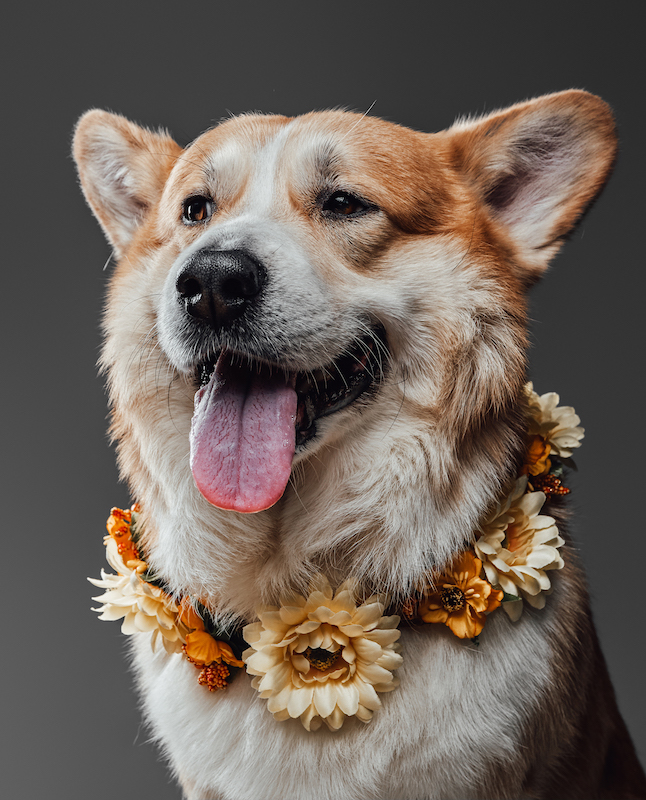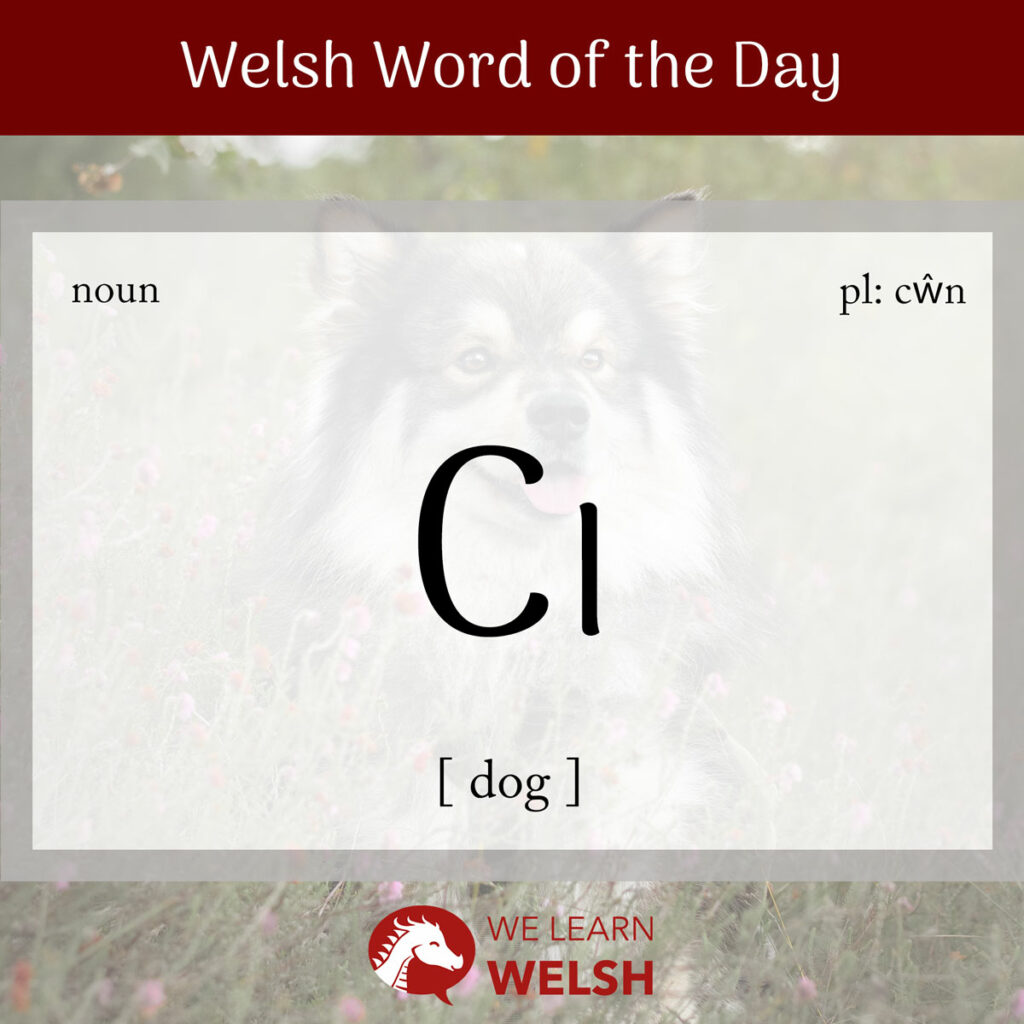Today’s word of the day is ci, which in English translates to dog. These furry friends are the most popular anifail anwes (pet or literally caress animal) in the UK, with 28% of British adults welcoming one or more dogs into their home, so it’s worth learning to talk about them in Welsh!
ci
dog
Ci is a masculine noun and is susceptible to all three mutations:
Soft mutation
gi
Nasal mutation
nghi
Aspirate mutation
chi
Here are some examples of how to use the different mutated forms of ci:
- fy nghi i = my dog
- Dau Gi Bach = Two Little Dogs (Welsh nursery rhyme)
- cath a chi = a cat and a dog
I was seven when my family got ein ci cyntaf (our first dog) and I had the honour of choosing her name. In the end, I chose Llawen (merry), which is a useful Welsh word, but a strange choice of a name! I used to be afraid of dogs’ dannedd miniog (sharp teeth) and cyfarth swnllyd (loud barking), but I was charmed straight away by Llawen’s blew meddal (soft fur) and llygaid mawr (big eyes). Llawen was a croesiad (cross-breed) between a sbaengi (spaniel) and a ci defaid (collie). Here are some other dog breeds in Welsh:
- milgi = greyhound
- daeargi, ci codi cadno, ci codi llwynog = terrier (lit. earth dog, fox-raising dog)
- ci tarw = bulldog
- ci blaidd = German Shepherd (lit. wolf dog)
- adargi melyn = golden retriever (lit. yellow bird dog)
- corgi = corgi
Did you know that the English word corgi is borrowed from Welsh, and not the other way around? Corgi derives from ci and the old Welsh word cor (dwarf), which has now been replaced with corrach in everyday language.
Do you have a dog? How would you describe them?
- del = cute
- drwg = naughty
- drygionus = mischievous
- blewog = fluffy, hairy
- diog = lazy
- cyfeillgar = friendly
Here are some ways you might incorporate these adjectives into a sentence:
- Mae gen i gi… (I have a … dog.)
- Hoffwn i gi… (I would like a … dog.)
- Am gi… (What a … dog!)
Mae gen i gi blewog.
I have a fluffy dog.
Here is some essential vocabulary for the Welsh-speaking dog-owner:
- coler = collar (not to be confused with colur, which means make-up)
- mynd â’r ci am dro = to walk the dog
- bwydo’r ci = to feed the dog
- anwesu = to pet
- milfeddyg = vet
- ci bach = puppy
- tennyn = lead
- Eistedda! = Sit!
- Arhosa! = Stay!

The plural of ci is cŵn. As a result, any dog breeds ending in -gi have this ending changed to -gwn in the plural. For example, the plural of corgi is corgwn, and the plural of adargi is adargwn. Both ci and cŵn are used in Welsh idioms such as:
- mynd rhwng y cŵn a’r brain = to go to the dogs (lit. to go between the dogs and the crows)
- byw fel cŵn a moch = to lead a cat and dog life (lit. to live like dogs and pigs)
- codi cyn cŵn Caer = to get up at the crack of dawn (lit. to get up before the dogs of Chester)
- daw haf i gi = every dog has his day (lit. summer will come for a dog)
- na ddeffro’r ci sy’n cysgu = let sleeping dogs lie (lit. don’t wake the dog that’s sleeping)
- mae newid y ci arno = it’s dirt cheap (lit. the dog’s change is on it)
It’s not just idioms; dogs show up in the names for all sorts of things in Welsh! Here are some of my favourite examples:
- bysedd y cŵn = foxgloves (lit. the dogs’ fingers)
- cŵn Ebrill = curlews (lit. April dogs)
- ci llidiart = a gate’s hinge (lit. gate dog)
- dyfrgi, dwrgi = otter (lit. water dog)
- gwenci = weasel, stoat (comes from gwanc ci, hunger dog)
Mae gan fy nghi glustiau mawr llipa.
My dog has big floppy ears.
Despite being a nation of dog-lovers, lots of insults in Welsh use the word ci:
- drewgi, corgi = contemptible/disgusting person (lit. stink dog, corgi)
- celwyddgi = liar (lit. lie dog)
- bolgi = glutton, greedy-guts (lit. greed dog)
- penci = idiot (lit. dogfish)
- llwfrgi = coward (lit. damp dog/cowardly dog)
- croengi = miser (lit. skin dog)
- brawlgi = chatterbox (lit. boast dog)
- sychgi = bore (lit. dry dog)
- cynffongi = sycophant, suck-up (lit. tail dog)
Cŵn even have a part to play in chwedloniaeth Gymreig (Welsh mythology). For instance, if you read the Mabinogi, you’ll come across cŵn Annwn, a pack of hunting hounds (helgwn, cŵn hela) with snow-white fur and red ears belonging to the mysterious Arawn, king of Annwn, the underworld. These mythical dogs are often referred to in English as the hounds of hell, but Annwn is actually portrayed as a paradise in early Welsh mythology, taking on hellish elements only in later myths due to Christian influence.
If you live in Sir Forgannwg (Glamorganshire), you may have heard of a similar pack of mythical dogs known as cŵn bendith y mamau (fairy dogs). These dogs are said to walk ahead of funeral processions, leading them to the mynwent (graveyard). Bendith y mamau (lit. the mothers’ blessing) is a local euphemism for tylwyth teg (fairies).
Did you learn anything new about man’s best friend today? If so, why not share some Welsh dog facts with your friends? It’s such an interesting topic, it’s easy to turn into a brawlgi if you’re not careful!

